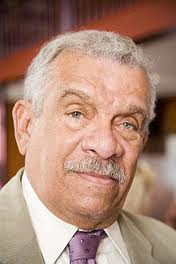The list always surprises people, and so does my answer to the follow-up question: Who is your favourite writer? Because my favourite writer isn't a pioneer of realism or young adult literature or speculative fiction. He isn't even a novelist. My favourite writer is this man, poet and Nobel laureate Derek Walcott, who last week celebrated his 83rd birthday:
Break a vase, and the love that reassembles the fragments is stronger than that love which took its symmetry for granted when it was whole.
So what connection do I feel, a 23-year-old who has only left Europe once, with the writing of an 83-year-old poet whose work is praised for capturing the sea and the land and the people of St Lucia, and in particular the aftermath of the colonial experience? What has Walcott taught me about writing? Well, not much it might seem. I didn't read his poems and begin writing poetry, or save up for a flight to the Caribbean so I could put the sea and the hills and the ruined colonial buildings into my own words. That would have been as pointless as trying to recreate Middlemarch or The Catcher in the Rye. It wasn't that direct. Like all my favourite writers, Derek Walcott isn't someone whose work I try to imitate -- which probably explains why there aren't really any young adult authors or modern realist authors or alternate reality authors on the list. Those things probably come from my own way of seeing the world. I don't want to write with the same style as Derek Walcott, or about the same subjects. I'm more interested in writing with the same spirit. For sixty years, Walcott has written with an attention to detail, a love for the craft, which is as extreme and unwavering as a master painter's attention to the strokes on the canvas. In fact, I think that's something that all my favourite writers have in common, which is perhaps why a lot of them are thought of as 'poetic' or 'artistic' in the way they use language.
There is a classic piece of writing advice that goes something like this: writing about the particular, the mundane, the ordinary, leads something to emerge that crosses time and place and speaks to people on the other side of the world about things like love, like loss, like what it means to be human. Walcott taught me that if you pay enough attention to the words on the page, something bigger than the words emerges. It is difficult to explain this properly, though Walcott himself could probably do a good job of it. I guess what I mean is that Walcott's poetry is not really St Lucia, but the love the islander feels for the island, not really the hillside shack or the white pillared colonial house, but home and homesickness and homecoming. If you read Walcott's poems, they show you the bare light of the island, the way the sea looks after a storm, the sounds of poverty, the voices of the islanders, but they also tell you things like 'There is no sea as restless as my heart' or 'there are homecomings without home' or 'I have not loved those that I loved enough.' You don't have to have lived in St Lucia for 83 years yourself to understand.
I write this in gratitude then, to Mr Walcott and my other favourite writers both living and dead, not for teaching me what to write, but for teaching me how to write, in what spirit to begin work each morning; for teaching me that words are hard work but that words are also flight, that true writing captures the world at the same time that it blesses it, upholds it, transforms it.

 RSS Feed
RSS Feed
